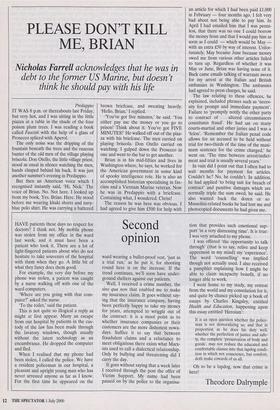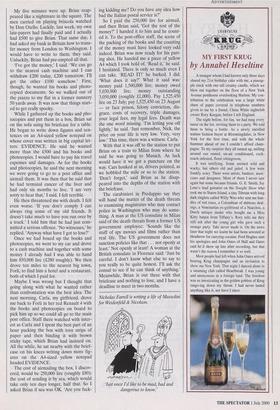PLEASE DON'T KILL ME, BRIAN
Nicholas Farrell acknowledges that he was in
debt to the former US Marine, but doesn't think he should pay with his life
Predappio IT WAS 8 p.m. or thereabouts last Friday, but very hot, and I was sitting in the little piazza at a table in the shade of the four poison plum trees. I was reading a book called Fascisti with the help of a glass of Prosecco spliced with Aperol.
The only noise was the dripping of the fountain beneath the trees and the raucous banter of the old men of the village playing briscola. Don Otello, the little village priest, stood as usual in silence watching the men, hands clasped behind his back. It was just another summer's evening in Predappio.
But then an American voice which I recognised instantly said, `Hi, Nick.' The voice of Brian. No. Not here. I looked up from my book. Yes. Brian. Here. He stood before me wearing khaki shorts and navy- blue polo shirt. He was carrying a battered brown briefcase, and sweating heavily. `Hello, Brian,' I replied.
`You've got five minutes,' he said. 'You either pay me the money or you go to prison! Think about it. You've got FIVE MINUTES!' He walked off out of the piaz- za with his briefcase. The men carried on playing briscola. Don Otello carried on watching. I gulped down the Prosecco in one and went to the bar to get another.
Brian is in his mid-fifties and lives in Washington where, he says, he worked for the American government in some kind of spooky intelligence role. He is also an accomplished historian specialising in fas- cism and a Vietnam Marine veteran. Now he was in Predappio with a briefcase. Containing what, I wondered. Christ!
The reason he was here was obvious. I had agreed to give him £500 for help with an article for which I had been paid £1,000 in February — four months ago. I felt very bad about not being able to pay him. In April I had emailed him that I was penni- less, that there was no one I could borrow the money from and that I would pay him as soon as I could — which would be May with an extra £50 by way of interest. Unfor- tunately, May became June because money owed me from various other articles failed to turn up. Regardless of whether it was May or June, Brian was having none of it. Back came emails talking of warrants sworn for my arrest at the Italian and British embassies in Washington. The embassies had agreed to press charges, he said.
The law relating to these offences, he explained, included phrases such as 'neces- sity for prompt and immediate payment'. Failure to 'promptly notify the other party to contract of . . . altered circumstances constitutes fraud'. He had sat on many courts-martial and other juries and I was a `felon'. 'Remember the Italian penal code allows for an accused to be held without trial for two-thirds of the time of the maxi- mum sentence for the crime charged,' he went on. 'The time between arrest/indict- ment and trial is usually several years.'
In vain did I point out that I often had to wait months for payment for articles. Couldn't he? No, he couldn't. In addition, he had applied 'to bring suit for breach of contract' and punitive damages which are normally triple the sum owed, he said. He also wanted back the dozen or so Mussolini-related books he had lent me and photocopied documents he had given me. My five minutes were up. Brian reap- peared like a nightmare in the square. The men carried on playing briscola watched by Don Otello. Luckily, last week, my own late-payers had finally paid and I actually had £500 to give Brian. That same day, I had asked my bank in Britain how to trans- fer money from London to Washington. I would have to write to them, they said. Unluckily, Brian had pre-empted all that.
`I've got the money,' I said. 'We can go to the nearest cash machine and I can withdraw £200 today, £200 tomorrow. I'll get the other £100 somehow.' First, though, he wanted his books and photo- copied documents. So we walked out of the piazza to my flat in a former nunnery 50 yards away. It was now that things start- ed to get really spooky.
While I gathered up the books and pho- tocopies and put them in a box, Brian sat on the sofa using his briefcase for a table. He began to write down figures and sen- tences on an A4-sized yellow notepad on whose cover was written in big capital let- ters: EVIDENCE. He said he wanted more than the £500 and his books and photocopies. I would have to pay his travel expenses and damages. As for the books and photocopies, he said the next morning we were going to go to a post office and airmail them. It was then that he said that he had terminal cancer of the liver and had only six months to live. 'I am very sorry to hear that,' I said. I felt terrible.
He then threatened me with death. I felt even worse. 'If you don't comply I can always ring some of my old friends. It doesn't take much to have you run over by a truck.' I told him that he had just com- mitted a serious offence. 'No witnesses,' he replied. 'Anyway what have I got to lose?'
Once we had boxed up the books and photocopies, we went to my car and drove to a cash machine and together with some money I already had I was able to hand him 850,000 lire (£280 roughly). We then drove ten miles to the nearest big town, Forli, to find him a hotel and a restaurant, both of which I paid for.
Maybe I was wrong but 1 thought that going along with what he wanted rather than confrontation was the best idea. The next morning, Carla, my girlfriend, drove me back to Forli in her red Renault 4 with the books and photocopies on board to pick him up so we could all go to the main post office. Staff there watched with inter- est as Carla and I spent the best part of an hour packing the box with torn strips of paper and then binding it with brown sticky tape, which Brian had insisted on. All the while, he sat nearby with the brief- case on his knees writing down more fig- ures on the A4-sized yellow notepad headed EVIDENCE.
The cost of airmailing the box, I discov- ered, would be 250,000 lire (roughly £80); the cost of sending it by sea, which would take only ten days longer, half that. So I asked Brian if sea was OK. 'Are you fuck- ing kidding me? Do you have any idea how bad the Italian postal service is?'
So I paid the 250,000 lire for airmail, and then Brian said, 'Got the rest of the money?' I handed it to him and he count- ed it. To the post-office staff, the scene of the packing of the books and the counting of the money must have looked very odd indeed. Brian was now ready for his part- ing shot. He handed me a piece of yellow A4 which I took hold of. 'Read it,' he said. I hesitated. There is only so much even I can take. 'READ IT!' he barked. I did. `What does it say?' What it said was: money paid 1,500,000 lire; money owed 5,030,900 lire; money outstanding 3,050,000 (roughly £1,000). Pay 1,525,450 lire on 23 July; pay 1,525,450 on 23 August — or face prison, felony conviction, dis- grace, costs of recovery, triple damages, your legal fees, my legal fees. Death was the one word missing. 'I'm letting you off lightly,' he said. 'Just remember, Nick, the price on your life is very low. Very, very low.' This time, there was a witness. Carla.
With that it was off to the station to put Brian on a train to Milan from where he said he was going to Munich. As luck would have it we got a puncture on the way. Cars honked at us, drivers pointed, as we hobbled the mile or so to the station. `Don't forget,' said Brian as he disap- peared into the depths of the station with the briefcase.
The carabinieri in Predappio say they will hand the matter of the death threats to examining magistrates who may contact police in Washington who may do some- thing. A man at the US consulate in Milan said of the death threats from a former US government employee: 'Sounds like the stuff of spy movies and films rather than real life. The US government does not sanction policies like that . . not openly at least.' Not openly at least! A woman at the British consulate in Florence said: 'Just be careful. I don't know what else to say to you really to be quite honest. I'll ask the consul to see if he can think of anything.' Meanwhile, Brian is out there with that briefcase and nothing to lose, and I have a deadline to meet in two months.
Nicholas Farrell is writing a life of Mussolini for Weidenfeld & Nicolson.
Just once I'd like to be mad, bad and dangerous to know.'



























































 Previous page
Previous page